#Bona Fide Productions
Photo

Kosta Brown | Bona Fide Productions
37 notes
·
View notes
Photo

First off, let me just say Ray, baby, I'm so proud of you. What a delightful directorial debut. This also showcases his wonderful acting, plus that comedic timing, and such thoughtful writing. I can't lie and not say I was already a huge Ray Romano fan, but also ten minutes in I felt unsure about what this movie would be. This film throws you into a fair amount of stereotypical characters that feel very dated, while not bothering to really establish who is who and how they're related. You really don't need any of that though and the jokes that felt off to me or felt flat at first make complete sense by the end, and I doubt there would've been a subtler way to get you acquainted to the world you'll spend the runtime in. What shocked me was the subtleties in all the other places. The handling of the cancer backstory reveal in particular was just great story telling and incredibly well acted by Laurie Metcalf. Some of the story of Sticks and Dani could've easily felt cheesy or done before, but each character was really fleshed out in a fresh way. Also very well acted. For a fair amount of seemingly unlikable characters this story felt lived in and true. I had begun to wonder if this movie was just Adam Sandler's Hustle with Ray Romano, but it's more like My Big Fat Greek Wedding meets Hustle meets High School Musical (okay, maybe not really - but I do need a supercut of the Ray Romano singing bits). This movie had me laughing, yelling, and crying. I was genuinely touched at the end when Ray envisions his father saying that Sticks is lucky to have him and he thanks his dad - once again, an incredibly subtle choice to have this imagined moment. This movie got the internal workings of people so damn well. I can't give it a full five because it's far from perfect with some clunky cinematography and editing, but what a valiant effort. Beautiful stuff.
I am left to ask who played Wally the tax advertiser? Because he sounded like a young Ray Romano (yes, I'm obsessed).
#ray romano#laurie metcalf#somewhere in queens#somewhere in queens (2023)#movie#movies#films#film#movie review#movie reviews#film review#film reviews#cinema#Jacob Ward#Sadie Stanley#bona fide productions#Mark Stegemann
1 note
·
View note
Text
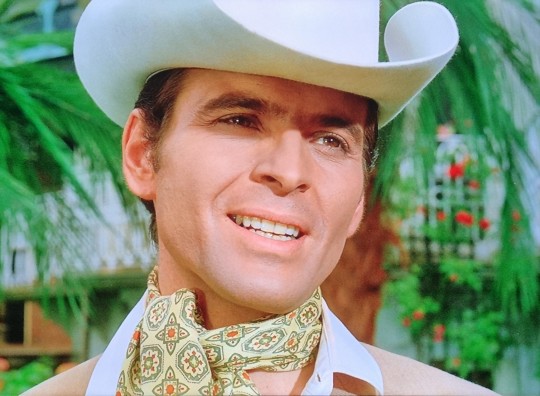
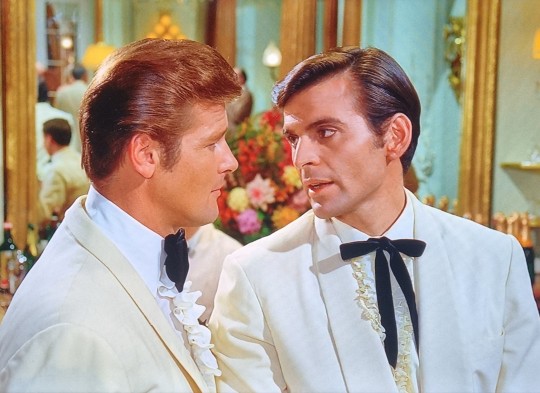
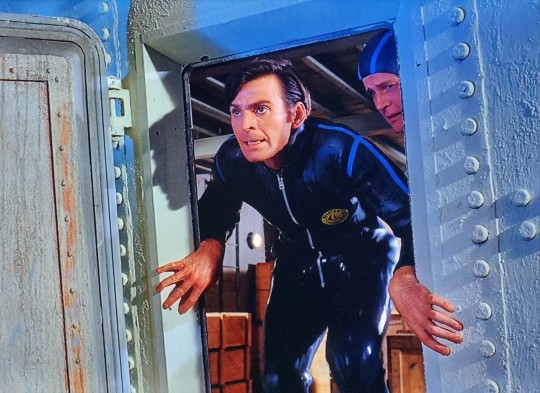
Stuart Damon guest stars as Texan oil baron (and Simon's new bff) Rod Huston in The Saint: The Ex-King of Diamonds (6.17, ITC, 1969); this episode was the direct inspiration for Roger Moore's subsequent series The Persuaders! (ITC, 1971 - 72)
#fave spotting#stuart damon#the champions#craig stirling#the saint#the ex king of diamonds#itc#1969#the persuaders!#classic tv#something about the formula of stiff upper lipped english gent with new money American wiseguy really appealed to the production team#producer Robert S. Baker and ITC head honcho Lew Grade seem to have begun planning The Persuaders! almost immediately from this point#bringing Moore back (and with a much greater creative control than he'd had even on The Saint); alas not returning was Stuart Damon#i mean i don't think it's any reflection on him or his performance here; they replaced him with goddamn Tony Curtis‚ a bona fide Hollywood#legend. but it is a shame bc Stuart is so so good here; he's absolutely having a ball with it‚ from his thick Texan accent to his over#sized cowboy hat‚ from the little subtle comic business he's doing (he sits at a table for a fancy pants high stakes card game without#waiting for their host and there's a beautiful little moment he does of realising everyone else is standing as the host enters and trying#to get back up again before everyone sits down). it's a beautiful performance‚ genuinely one of the best guest spots‚ i think‚ that the#series ever had in its 100 plus episodes. when this aired The Champions would have been roughly in the middle of its run#given the fairly lengthy production on The Saint‚ it's possible he filmed this before starting work on The Champions; then again‚ he has#top billing and is the main guest‚ which might suggest he was expected to be a familiar tv star by the time this went out#hard to say without a Pixley bible... regardless he seems to have very good chemistry with Moore. but then Curtis appeared to as well and#they apparently did not always particularly get along during filming of The Persuaders so who knows#with just 3 eps left this could quite probably be my final fave spotted in the saint; it's been quite the journey but I'm grateful to the#familiar faces who popped up along the way and made it a little easier whenever it started to feel like a bit of a slog!
13 notes
·
View notes
Text

#giftsforher#giftsforhim#tshirts#kristalcurt#socks#mugs#stickers#findyourthing#redbubble#wall decor#artforsale#print#deals#dogs#dog#bona fide buddy#bone#dog bone#pet products#mats#blankets#mug#cup#leggings#bags#designer#image#fashion#interior design#office
1 note
·
View note
Text
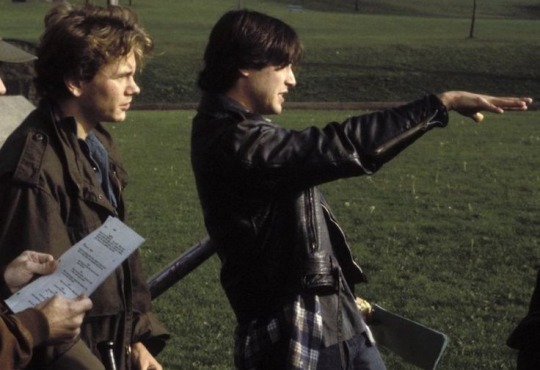
When the controversial film My Own Private Idaho began production, word in Hollywood was that Phoenix had convinced the recalcitrant Keanu Reeves to take the risk of also playing a gay character in the film. Phoenix disagrees. "Did it convince him? No. He was excited from the start," he recalls. "Keanu supported me and I supported him. But we had a sort of thing where if one didn't do it, the other wouldn't, as we impulsively decided at the same time to do it. So the only way I could follow up on such an impulsive idea it would be if we both did it.
During filming in Idaho in the fall of 1990, nine cast and crew members, including Phoenix and Keanu Reeves, slept on futons spread out in Van Sant's home. It was a college dorm, a tribe, a family. Van Sant showed me his garage, where a bona fide garage band consisting of Phoenix and Reeves and other Idaho actors, as well as Flea, the bassist for the Red Hot Chili Peppers, often played late into the night.
They played the sweet, out-of-order lyrics Phoenix had written for himself and his band, Aleka's Attic – "Run to the rescue with love / and peace will follow" or "Hey, hey, where's your halo gone? " They played Beatles and Led Zeppelin, balancing ashtrays in Van Sant's black BMW and drinking wine, smoking pot. Sometimes they ended up crying with Phoenix as he talked about disappearing rainforests.
(x)
1K notes
·
View notes
Text
Couch surfer in his 30s. Oscar winner in his 40s. Why the whole world wants Taika
**Notes: This is very long post!**
Good Weekend
In his 30s, he was sleeping on couches. By his 40s, he’d directed a Kiwi classic, taken a Marvel movie to billion-dollar success, and won an Oscar. Meet Taika Waititi, king of the oddball – and one of New Zealand’s most original creative exports.
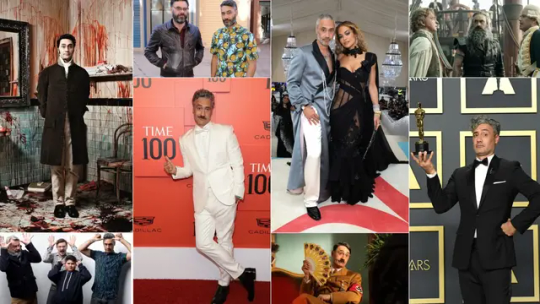
Taika Waititi: “Be a nice person and live a good life. And just don’t be an arsehole.”
The good news? Taika Waititi is still alive. I wasn’t sure. The screen we were speaking through jolted savagely a few minutes ago, with a cacophonous bang and a confused yelp, then radio silence. Now the Kiwi filmmaker is back, grinning like a loon: “I just broke the f---ing table, bro!”
Come again? “I just smashed this f---ing table and glass flew everywhere. It’s one of those old annoying colonial tables. It goes like this – see that?” Waititi says, holding up a folding furniture leg. “I hit the mechanism and it wasn’t locked. Anyway …”
I’m glad he’s fine. The stuff he’s been saying from his London hotel room could incur biblical wrath. We’re talking about his latest project, Next Goal Wins, a movie about the American Samoa soccer team’s quest to score a solitary goal, 10 years after suffering the worst loss in the game’s international history – a 31-0 ignominy to Australia – but our chat strays into spirituality, then faith, then religion.
“I don’t personally believe in a big guy sitting on a cloud judging everyone, but that’s just me,” Waititi says, deadpan. “Because I’m a grown-up.”
This is the way his interview answers often unfold. Waititi addresses your topic – dogma turns good people bad, he says, yet belief itself is worth lauding – but bookends every response with a conspiratorial nudge, wink, joke or poke. “Regardless of whether it’s some guy living on a cloud, or some other deity that you’ve made up – and they’re all made up – the message across the board is the same, and it’s important: Be a nice person, and live a good life. And just don’t be an arsehole!”
Not being an arsehole seems to have served Waititi, 48, well. Once a national treasure and indie darling (through the quirky tenderness of his breakout New Zealand films Boy in 2010 and Hunt for the Wilderpeople in 2016), Waititi then became a star of both the global box office (through his 2017 entry into the Marvel Universe, Thor: Ragnarok, which grossed more than $1.3 billion worldwide) and then the Academy Awards (winning the 2020 best adapted screenplay Oscar for his subversive Holocaust dramedy JoJo Rabbit, in which he played an imaginary Hitler).
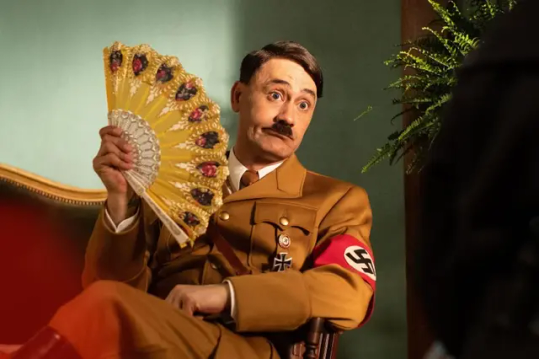
Waititi playing Adolf Hitler in the 2019 movie JoJo Rabbit. (Alamy)
A handsome devil with undeniable roguish charm, Waititi also slid seamlessly into style-icon status (attending this year’s Met Gala shirtless, in a floor-length gunmetal-grey Atelier Prabal Gurung wrap coat, with pendulous pearl necklaces), as well as becoming his own brand (releasing an eponymous line of canned coffee drinks) and bona fide Hollywood A-lister (he was introduced to his second wife, British singer Rita Ora, by actor Robert Pattinson at a barbecue).
Putting that platform to use, Waititi is an Indigenous pioneer and mentor, too, co-creating the critically acclaimed TV series Reservation Dogs, while co-founding the Piki Films production company, committed to promoting the next generation of storytellers – a mission that might sound all weighty and worthy, yet Waititi’s new wave of First Nations work is never earnest,
always mixing hurt with heart and howling humour.
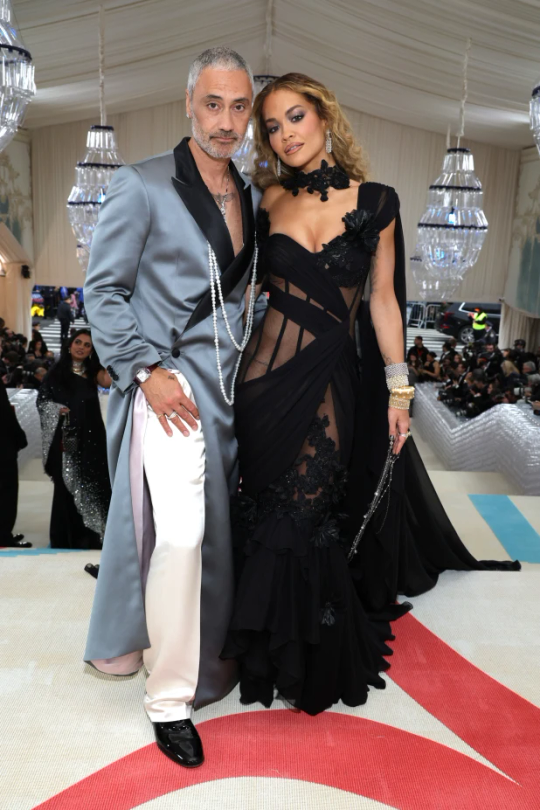
Waititi with wife Rita Ora at the 2023 Met Gala in May. (Getty Images)
Makes sense. Waititi is a byproduct of “the weirdest coupling ever” – his late Maori father from the Te Whanau-a-Apanui tribe was an artist, farmer and “Satan’s Slaves” bikie gang founder, while his Wellington schoolteacher mum descended from Russian Jews, although he’s not devout about her faith. (“No, I don’t practise,” he confirms. “I’m just good at everything, straight away.”)
He’s remained loyally tethered to his origin story, too – and to a cadre of creative Kiwi mates, including actors Jemaine Clement and Rhys Darby – never forgetting that not long before the actor/writer/producer/director was an industry maven, he was a penniless painter/photographer/ musician/comedian.
With no set title and no fixed address, he’s seemingly happy to be everything, everywhere (to everyone) all at once. “‘The universe’ is bandied around a lot these days, but I do believe in the kind of connective tissue of the universe, and the energy that – scientifically – we are made up of a bunch of atoms that are bouncing around off each other, and some of the atoms are just squished together a bit tighter than others,” he says, smiling. “We’re all made of the same stardust, and that’s pretty special.”
-----------------------------------------------
We’ve caught Waititi in a somewhat relaxed moment, right before the screen actors’ and media artists’ strike ends. He’s sensitive to the struggle but doesn’t deny enjoying the break. “I spent a lot of time thinking about writing, and not writing, and having a nice holiday,” he tells Good Weekend. “Honestly, it was a good chance just to recombobulate.”
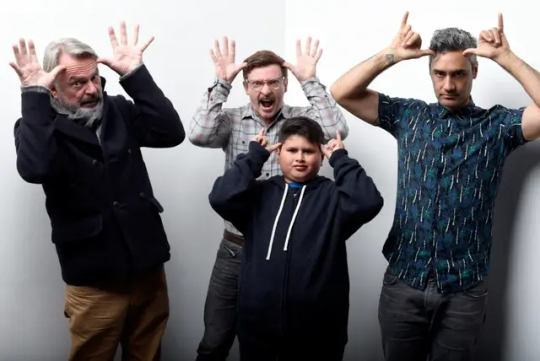
Waititi, at right, with Hunt for the Wilderpeople actors, from left, Sam Neill, Rhys Darby and Julian Dennison. (Getty Images)
It’s mid-October, and he’s just headed to Paris to watch his beloved All Blacks in the Rugby World Cup. He’s deeply obsessed with the game, and sport in general. “Humans spend all of our time knowing what’s going to happen with our day. There’s no surprises any more. We’ve become quite stagnant. And I think that’s why people love sport, because of the air of unpredictability,” he says. “It’s the last great arena entertainment.”
The main filmic touchstone for Next Goal Wins (which premieres in Australian cinemas on New Year’s Day) would be Cool Runnings (1993), the unlikely true story of a Jamaican bobsled team, but Waititi also draws from genre classics such as Any Given Sunday and Rocky, sampling trusted tropes like the musical training montage. (His best one is set to Everybody Wants to Rule the World by Tears for Fears.)
Filming in Hawaii was an uplifting experience for the self-described Polynesian Jew. “It wasn’t about death, or people being cruel to each other. Thematically, it was this simple idea, of getting a small win, and winning the game wasn’t even their goal – their goal was to get a goal,” he says. “It was a really sweet backbone.”
Waititi understands this because, growing up, he was as much an athlete as a nerd, fooling around with softball and soccer before discovering rugby league, then union. “There’s something about doing exercise when you don’t know you’re doing exercise,” he enthuses. “It’s all about the fun of throwing a ball around and trying to achieve something together.” (Whenever Waititi is in Auckland he joins his mates in a long-running weekend game of touch rugby. “And then throughout the week I work out every day. Obviously. I mean, look at me.”)
Auckland is where his kids live, too, so he spends as much time there as possible. Waititi met his first wife, producer Chelsea Winstanley, on the set of Boy in 2010, and they had two daughters, Matewa Kiritapu, 8, and his firstborn, Te Kainga O’Te Hinekahu, 11. (The latter is a derivative of his grandmother’s name, but he jokes with American friends that it means “Resurrection of Tupac” or “Mazda RX7″) Waititi and Winstanley split in about 2018, and he married the pop star Ora in 2022.
He offers a novel method for balancing work with parenthood … “Look, you just abandon them, and know that the experience will make them harder individuals later on in life. And it’s their problem,” he says. “I’m going to give them all of the things that they need, and I’m going to leave behind a decent bank account for their therapy, and they will be just like me, and the cycle will continue.”
Jokes aside – I think he’s joking – school holidays are always his, and he brings the girls onto the set of every movie he makes. “They know enough not to get in the way or touch anything that looks like it could kill you, and they know to be respectful and quiet when they need to. But they’re just very comfortable around filmmakers, which I’m really happy about, because eventually I hope they will get into the industry. One more year,” he laughs, “then they can leave school and come work for Dad.”
Theirs is certainly a different childhood than his. Growing up, he was a product of two worlds. His given names, for instance, were based on his appearance at birth: “Taika David” if he looked Maori (after his Maori grandfather) and “David Taika” if he looked Pakeha (after his white grandfather). His parents split when he was five, so he bounced between his dad’s place in Waihau Bay, where he went by the surname Waititi, and his mum, eight hours drive away in Wellington, where he went by Cohen (the last name on his birth certificate and passport).
Waititi was precocious, even charismatic. His mother Robin once told Radio New Zealand that people always wanted to know him, even as an infant: “I’d be on a bus with him, and he was that kind of baby who smiled at people, and next thing you know they’re saying, ‘Can I hold your baby?’ He’s always been a charmer to the public eye.”
He describes himself as a cool, sporty, good-looking nerd, raised on whatever pop culture screened on the two TV channels New Zealand offered in the early 1980s, from M*A*S*H and Taxi to Eddie Murphy and Michael Jackson. He was well-read, too. When punished by his mum, he would likely be forced to analyse a set of William Blake poems.
He puts on a whimpering voice to describe their finances – “We didn’t have much monneeey” – explaining how his mum spent her days in the classroom but also worked in pubs, where he would sit sipping a raspberry lemonade, doodling drawings and writing stories. She took in ironing and cleaned houses; he would help out, learning valuable lessons he imparts to his kids. “And to random people who come to my house,” he says. “I’ll say, ‘Here’s a novel idea, wash this dish,’ but people don’t know how to do anything these days.”
“Every single character I’ve ever written has been based on someone I’ve known or met or a story I’ve stolen from someone.” - Taika Waititi
He loved entertaining others, clearly, but also himself, recording little improvised radio plays on a tape deck – his own offbeat versions of ET and Indiana Jones and Star Wars. “Great free stuff where you don’t have any idea what the story is as you’re doing it,” he says. “You’re just sort of making it up and enjoying the freedom of playing god in this world where you can make people and characters do whatever you want.”
His other sphere of influence lay in Raukokore, the tiny town where his father lived. Although Boy is not autobiographical, it’s deeply personal insofar as it’s filmed in the house where he grew up, and where he lived a life similar to that portrayed in the story, surrounded by his recurring archetypes: warm grandmothers and worldly kids; staunch, stoic mums; and silly, stunted men. “Every single character I’ve ever written has been based on someone I’ve known or met,” he says, “or a story I’ve stolen from someone.”
He grew to love drawing and painting, obsessed early on with reproducing the Sistine Chapel. During a 2011 TED Talk on creativity, Waititi describes his odd subject matter, from swastikas and fawns to a picture of an old lady going for a walk … upon a sword … with Robocop. “My father was an outsider artist, even though he wouldn’t know what that meant,” Waititi told the audience in Doha. “I love the naive. I love people who can see things through an innocent viewpoint. It’s inspiring.”
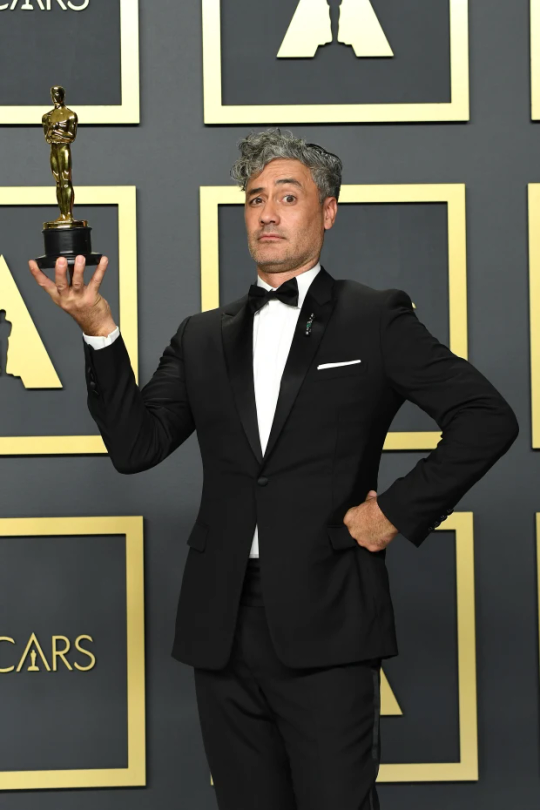
After winning Best Adapted Screenplay Academy Award for JoJo Rabbit in 2020. (Getty Images)
It was an interesting time in New Zealand, too – a coming-of-age decade in which the Maori were rediscovering their culture. His area was poor, “but only financially,” he says. “It’s very rich in terms of the people and the culture.” He learned kapa haka – the songs, dances and chants performed by competing tribes at cultural events, or to honour people at funerals and graduations – weddings, parties, anything. “Man, any excuse,” he explains. “A big part of doing them is to uplift your spirits.”
Photography was a passion, so I ask what he shot. “Just my penis. I sent them to people, but we didn’t have phones, so I would print them out, post them. One of the first dick pics,” he says. Actually, his lens was trained on regular people. He watches us still – in airports, restaurants. “Other times late at night, from a tree. Whatever it takes to get the story. You know that.”
He went to the Wellington state school Onslow College and did plays like Androcles and the Lion, A Midsummer Night’s Dream and The Crucible. His crew of arty students eventually ended up on stage at Bats Theatre in the city, where they would perform haphazard comedy shows for years.
“Taika was always rebellious and wild in his comedy, which I loved,” says his high school mate Jackie van Beek, who became a longtime collaborator, including working with Waititi on a Tourism New Zealand campaign this year. “I remember he went through a phase of turning up in bars around town wearing wigs, and you’d try and sit down and have a drink with him but he’d be doing some weird character that would invariably turn up in some show down the track.”
He met more like-minded peers at Victoria University, including Jemaine Clement (who’d later become co-creator of Flight of the Conchords). During a 2019 chat with actor Elijah Wood, Waititi describes he and Clement clocking one another from opposite sides of the library one day: a pair of Maoris experiencing hate at first sight, based on a mutual suspicion of cultural appropriation. (Clement was wearing a traditional tapa cloth Samoan shirt, and Waititi was like: “This motherf---er’s not Samoan.” Meanwhile, Waititi was wearing a Rastafarian beanie, and Clement was like, “This motherf---er’s not Jamaican.”)
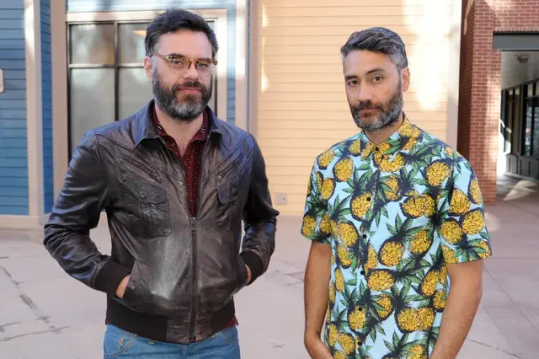
With Jemaine Clement in 2014. (Getty Images)
But they eventually bonded over Blackadder and Fawlty Towers, and especially Kenny Everett, and did comedy shows together everywhere from Edinburgh to Melbourne. Waititi was almost itinerant, spending months at a time busking, or living in a commune in Berlin. He acted in a few small films, and then – while playing a stripper on a bad TV show – realised he wanted to try life behind the camera. “I became tired of being told what to do and ordered around,” he told Wellington’s Dominion Post in 2004. “I remember sitting around in the green room in my G-string thinking, ‘Why am I doing this? Just helping someone else to realise their dream.’ ”
He did two strong short films, then directed his first feature – Eagle vs Shark (2007) – when he was 32. He brought his mates along (Clement, starring with Waititi’s then-girlfriend Loren Horsley), setting something of a pattern in his career: hiring friends instead of constantly navigating new working relationships. “If you look at things I’m doing,” he tells me, “there’s always a few common denominators.”
Sam Neill says Waititi is the exemplar of a new New Zealand humour. “The basis of it is this: we’re just a little bit crap at things.”
This gang of collaborators shares a common Kiwi vibe, too, which his longtime friend, actor Rhys Darby, once coined “the comedy of the mundane”. Their new TV show, Our Flag Means Death, for example, leans heavily into the mundanity of pirate life – what happens on those long days at sea when the crew aren’t unsheathing swords from scabbards or burying treasure.
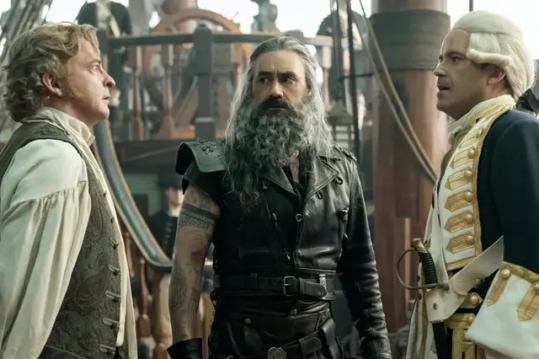
Waititi plays pirate captain Blackbeard, centre, in Our Flag Means Death, with Rhys Darby, left, and Rory Kinnear. (Google Images)
Sam Neill, who first met Waititi when starring in Hunt for the Wilderpeople, says Waititi is the exemplar of a new New Zealand humour. “And I think the basis of it is this,” says Neill. “We’re just a little bit crap at things, and that in itself is funny.” After all, Neill asks, what is What We Do in The Shadows (2014) if not a film (then later a TV show) about a bunch of vampires who are pretty crap at being vampires, living in a pretty crappy house, not quite getting busted by crappy local cops? “New Zealand often gets named as the least corrupt country in the world, and I think it’s just that we would be pretty crap at being corrupt,” Neill says. “We don’t have the capacity for it.”
Waititi’s whimsy also spurns the dominant on-screen oeuvre of his homeland – the so-called “cinema of unease” exemplified by the brutality of Once Were Warriors (1994) and the emotional peril of The Piano (1993). Waititi still explores pathos and pain, but through laughter and weirdness. “Taika feels to me like an antidote to that dark aspect, and a gift somehow,” Neill says. “And I’m grateful for that.”
-----------------------------------------------
Something happened to Taika Waititi when he was about 11 – something he doesn’t go into with Good Weekend, but which he considered a betrayal by the adults in his life. He mentioned it only recently – not the moment itself, but the lesson he learnt: “That you cannot and must not rely on grown-ups to help you – you’re basically in the world alone, and you’re gonna die alone, and you’ve just gotta make it all for yourself,” he told Irish podcast host James Brown. “I basically never forgave people in positions of responsibility.”
What does that mean in his work? First, his finest films tend to reflect the clarity of mind possessed by children, and the unseen worlds they create – fantasies conjured up as a way to understand or overcome. (His mum once summed up the main message of Boy: “The unconditional love you get from your children, and how many of us waste that, and don’t know what we’ve got.”)
Second, he’s suited to movie-making – “Russian roulette with art” – because he’s drawn to disruptive force and chaos. And that in turn produces creative defiance: allowing him to reinvigorate the Marvel Universe by making superheroes fallible, or tell a Holocaust story by making fun of Hitler. “Whenever I have to deal with someone who’s a boss, or in charge, I challenge them,” he told Brown, “and I really do take whatever they say with a pinch of salt.”
It’s no surprise then that Waititi was comfortable leaping from independent films to the vast complexity of Hollywood blockbusters. He loves the challenge of coordinating a thousand interlocking parts, requiring an army of experts in vocations as diverse as construction, sound, art, performance and logistics. “I delegate a lot,” he says, “and share the load with a lot of people.”
“This is a cool concept, being able to afford whatever I want, as opposed to sleeping on couches until I was 35.” - Taika Waititi
But the buck stops with him. Time magazine named Waititi one of its Most Influential 100 People of 2022. “You can tell that a film was made by Taika Waititi the same way you can tell a piece was painted by Picasso,” wrote Sacha Baron Cohen. Compassionate but comic. Satirical but watchable. Rockstar but auteur. “Actually, sorry, but this guy’s really starting to piss me off,” Cohen concluded. “Can someone else write this piece?”
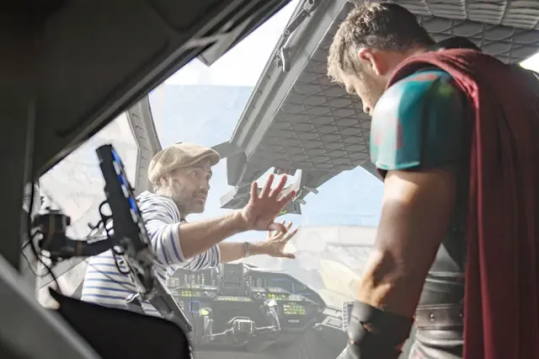
Directing Chris Hemsworth in 2017 in Thor: Ragnarok, which grossed more than $1.3 billion at the box office. (Alamy)
I’m curious to know how he stays grounded amid such adulation. Coming into the game late, he says, helped immensely. After all, Waititi was 40 by the time he left New Zealand to do Thor: Ragnarok. “If you let things go to your head, then it means you’ve struggled to find out who you are,” he says. “But I’ve always felt very comfortable with who I am.” Hollywood access and acclaim – and the pay cheques – don’t erase memories of poverty, either. “It’s more like, ‘Oh, this is a cool concept, being able to afford whatever I want, as opposed to sleeping on couches until I was 35.’ ” Small towns and strong tribes keep him in check, too. “You know you can’t piss around and be a fool, because you’re going to embarrass your family,” he says. “Hasn’t stopped me, though.”
Sam Neill says there was never any doubt Waititi would be able to steer a major movie with energy and imagination. “It’s no accident that the whole world wants Taika,” he says. “But his seductiveness comes with its own dangers. You can spread yourself a bit thin. The temptation will be to do more, more, more. That’ll be interesting to watch.”
Indeed, I find myself vicariously stressed out over the list of potential projects in Waititi’s future. A Roald Dahl animated series for Netflix. An Apple TV show based on the 1981 film Time Bandits. A sequel to What We Do In The Shadows. A reboot of Flash Gordon. A gonzo horror comedy, The Auteur, starring Jude Law. Adapting a cult graphic novel, The Incal, as a feature. A streaming series based on the novel Interior Chinatown. A film based on a Kazuo Ishiguro bestseller. Plus bringing to life the wildly popular Akira comic books. Oh, and for good measure, a new instalment of Star Wars, which he’s already warned the world will be … different.
“It’s going to change things,” he told Good Morning America. “It’s going to change what you guys know and expect.”
Did I say I was stressed for Waititi? I meant physically sick.
“Well…” he qualifies, “some of those things I’m just producing, so I come up with an idea or someone comes to me with an idea, and I shape how ‘it’s this kind of show’ and ‘here’s how we can get it made.’ It’s easier for me to have a part in those things and feel like I’ve had a meaningful role in the creative process, but also not having to do what I’ve always done, which is trying to control everything.”
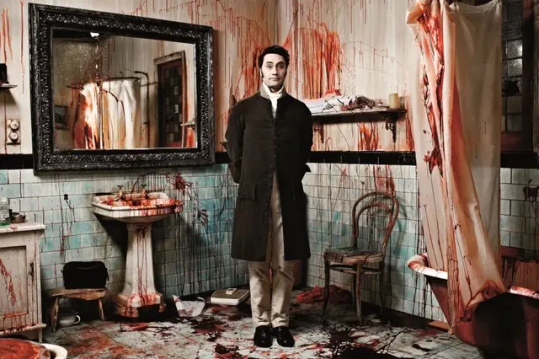
In the 2014 mockumentary horror film What We Do in the Shadows, which he co-directed with Jemaine Clement. (Alamy)
What about moving away from the niche New Zealand settings he represented so well in his early work? How does he stay connected to his roots? “I think you just need to know where you’re from,” he says, “and just don’t forget that.”
They certainly haven’t forgotten him.
Jasmin McSweeney sits in her office at the New Zealand Film Commission in Wellington, surrounded by promotional posters Waititi signed for her two decades ago, when she was tasked with promoting his nascent talent. Now the organisation’s marketing chief, she talks to me after visiting the heart of thriving “Wellywood”, overseeing the traditional karakia prayer on the set of a new movie starring Geoffrey Rush.
Waititi isn’t the first great Kiwi filmmaker – dual Oscar-winner Jane Campion and blockbuster king Peter Jackson come to mind – yet his particular ascendance, she says, has spurred unparalleled enthusiasm. “Taika gave everyone here confidence. He always says, ‘Don’t sit around waiting for people to say, you can do this.’ Just do it, because he just did it. That’s the Taika effect.”
-----------------------------------------------
Taika David Waititi is known for wearing everything from technicolour dreamcoats to pineapple print rompers, and today he’s wearing a roomy teal and white Isabel Marant jumper. The mohair garment has the same wispy frizz as his hair, which curls like a wave of grey steel wool, and connects with a shorn salty beard.
A stylish silver fox, it wouldn’t surprise anyone if he suddenly announced he was launching a fashion label. He’s definitely a commercial animal, to the point of directing television commercials for Coke and Amazon, along with a fabulous 2023 spot for Belvedere vodka starring Daniel Craig. He also joined forces with a beverage company in Finland (where “taika” means “magic”) to release his coffee drinks. Announcing the partnership on social media, he flagged that he would be doing more of this kind of stuff, too (“Soz not soz”).
Waititi has long been sick of reverent portrayals of Indigenous people talking to spirits.
There’s substance behind the swank. Fashion is a creative outlet but he’s also bought sewing machines in the past with the intention of designing and making clothes, and comes from a family of tailors. “I learnt how to sew a button on when I was very young,” he says. “I learnt how to fix holes or patches in your clothes, and darn things.”
And while he gallivants around the globe watching Wimbledon or modelling for Hermès at New York Fashion Week, all that glamour belies a depth of purpose, particularly when it comes to Indigenous representation.
There’s a moment in his new movie where a Samoan player realises that their Dutch coach, played by Michael Fassbender, is emotionally struggling, and he offers a lament for white people: “They need us.” I can’t help but think Waititi meant something more by that line – maybe that First Nations people have wisdom to offer if others will just listen?
“Weeelllll, a little bit …” he says – but from his intonation, and what he says next, I’m dead wrong. Waititi has long been sick of reverent portrayals of Indigenous people talking to kehua (spirits), or riding a ghost waka (phantom canoe), or playing a flute on a mountain. “Always the boring characters,” he says. “They’ve got no real contemporary relationship with the world, because they’re always living in the past in their spiritual ways.”

A scene from Next Goal Wins, filmed earlier this year. (Alamy)
He’s part of a vanguard consciously poking fun at those stereotypes. Another is the Navajo writer and director Billy Luther, who met Waititi at Sundance Film Festival back in 2003, along with Reservation Dogs co-creator Sterlin Harjo. “We were this group of outsiders trying to make films, when nobody was really biting,” says Luther. “It was a different time. The really cool thing about it now is we’re all working. We persevered. We didn’t give up. We slept on each other’s couches and hung out. It’s like family.”
Waititi has power now, and is known for using Indigenous interns wherever possible (“because there weren’t those opportunities when I was growing up”), making important introductions, offering feedback on scripts, and lending his name to projects through executive producer credits, too, which he did for Luther’s new feature film, Frybread Face and Me (2023).
He called Luther back from the set of Thor: Love and Thunder (2022) to offer advice on working with child actors – “Don’t box them into the characters you’ve created,” he said, “let them naturally figure it out on their own” – but it’s definitely harder to get Waititi on the phone these days. “He’s a little bitch,” Luther says, laughing. “Nah, there’s nothing like him. He’s a genius. You just knew he was going to be something. I just knew it. He’s my brother.“
I’ve been asked to explicitly avoid political questions in this interview, probably because Waititi tends to back so many causes, from child poverty and teenage suicide to a campaign protesting offshore gas and oil exploration near his tribal lands. But it’s hard to ignore his recent Instagram post, sharing a viral video about the Voice to Parliament referendum starring Indigenous Aussie rapper Adam Briggs. After all, we speak only two days after the proposal is defeated. “Yeah, sad to say but, Australia, you really shat the bed on that one,” Waititi says, pausing. “But go see my movie!”
About that movie – the early reviews aren’t great. IndieWire called it a misfire, too wrapped in its quirks to develop its arcs, with Waititi’s directorial voice drowning out his characters, while The Guardian called it “a shoddily made and strikingly unfunny attempt to tell an interesting story in an uninteresting way”. I want to know how he moves past that kind of criticism. “For a start, I never read reviews,” he says, concerned only with the opinion of people who paid for admission, never professional appraisals. “It’s not important to me. I know I’m good at what I do.”
Criticism that Indigenous concepts weren’t sufficiently explained in Next Goal Wins gets his back up a little, though. The film’s protagonist, Jaiyah Saelua, the first transgender football player in a FIFA World Cup qualifying match, is fa’afafine – an American Samoan identifier for someone with fluid genders – but there wasn’t much exposition of this concept in the film. “That’s not my job,” Waititi says. “It’s not a movie where I have to explain every facet of Samoan culture to an audience. Our job is to retain our culture, and present a story that’s inherently Polynesian, and if you don’t like it, you can go and watch any number of those other movies out there, 99 per cent of which are terrible.”
*notes: (there is video clip in the article)
Waititi sounds momentarily cranky, but he’s mostly unflappable and hilarious. He’s the kind of guy who prefers “Correctumundo bro!” to “Yes”. When our video connection is too laggy, he plays up to it by periodically pretending to be frozen, sitting perfectly still, mouth open, his big shifting eyeballs the only giveaway.
He’s at his best on set. Saelua sat next to him in Honolulu while filming the joyous soccer sequences. “He’s so chill. He just let the actors do their thing, giving them creative freedom, barely interjecting unless it was something important. His style matches the vibe of the Pacific people. We’re a very funny people. We like to laugh. He just fit perfectly.”
People do seem to love working alongside him, citing his ability to make productions fresh and unpredictable and funny. Chris Hemsworth once said that Waititi’s favourite gag is to “forget” that his microphone is switched on, so he can go on a pantomime rant for all to hear – usually about his disastrous Australian lead actor – only to “remember” that he’s wired and the whole crew is listening.
“I wouldn’t know about that, because I don’t listen to what other people say about anything – I’ve told you this,” Waititi says. “I just try to have fun when there’s time to have fun. And when you do that, and you bring people together, they’re more willing to go the extra mile for you, and they’re more willing to believe in the thing that you’re trying to do.”
Yes, he plays music between takes, and dances out of his director’s chair, but it’s really all about relaxing amid the immense pressure and intense privilege of making movies. “Do you know how hard it is just to get anything financed or green-lit, then getting a crew, getting producers to put all the pieces together, and then making it to set?” Waititi asks. “It’s a real gift, even to be working, and I feel like I have to remind people of that: enjoy this moment.”
Source: The Age
By: Konrad Marshall (December 1, 2023)
193 notes
·
View notes
Text
Today in, "Conservatives keep making me side with Disney"...
So, Gina Carano is suing Disney. And Elon Musk is paying for her lawyers. And they released the complaint document.
It's... a doozy.
I can't decide if her lawyers are not taking this seriously at all or if they are taking it super duper extra seriously.

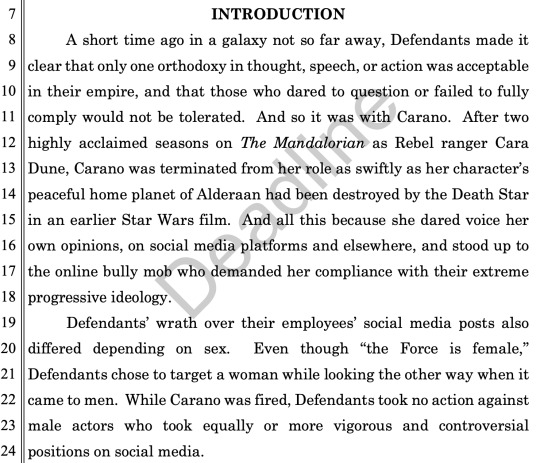
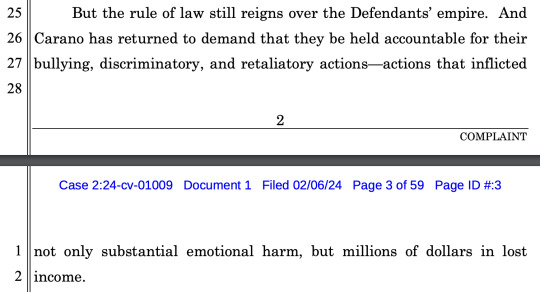
Like, that's a real thing that a lawyer wrote.
As you know, judges are famous for enjoying levity in official court documents. I think in law school you are encouraged to add comedy bits. True facts.
Gina wants money for emotional damages. But she also wants to be rehired, which sounds like another funny comedy bit. They scrapped an entire show because of her nonsense.
Most are saying this will get thrown out with haste due to the fact that Gina wasn't actually fired. She had already done her contracted work. Disney decided not to hire her for any *new* work. So I guess she wants them to honor an imaginary contract that was in her head.
The entire document is just as ridiculous as the opening crawl. It starts out by listing Gina's show biz bona fides. Her myriad accomplishments in Hollywood were listed one by one in a section titled...

Well, I'm intrigued.
Let's take a look at this illustrious career, according to this document.
"Carano is the first-ever female star in mixed martial arts cage fighting to successfully transition to a career in movies, breaking down substantial barriers for women in the sport."
Off to an interesting start.
All the cage fighting gals can act in movies now and they all have Gina to thank for barrier busting.
"Carano received roles in Hollywood and independent film productions such as Haywire, Fast & Furious 6, Heist, Deadpool, Almost Human, Extraction, Daughter of the Wolf, and Madness in the Method."
I've heard of several of those things! And I think I almost remember her in Deadpool! Very impressive.
Oh wait, they're not done...
"On May 13, 2008, “Gina Carano” was the fastest rising search
on Google and third most searched person on Yahoo! while being ranked no. 5 on Yahoo!’s “Top Ten Influential Women of 2008” list."
In 2008 she was popular on Yahoo for a bit. Got it.
Has she won any awards?
"In 2012, Carano was the first recipient of the ActionFest Film
Festival’s Chuck Norris Award for Best Female Action Star.
In 2017, Carano received the Artemis Action Warrior Award.
In 2019, Carano received The Rising Star award at Ischia
Film Festival."
Very prestigious. I'm sure Chuck Norris has a lovely basement where that ceremony was almost certainly held.
You know what, why don't we just skip to The Mandalorian?
"Although her character instantly became one of the most
recognized and popular characters in the series..."
Gina, no... that was the little green puppet.
You were the one who couldn't act very well but you made up for it by punching things good.
"Carano was again instrumental in the success of Season 2 of The Mandalorian."
Nope, still the puppet.
End of "accomplishments."
The next section is titled

For some reason they left out "bigoted" before speech. Weird.
In most of it, it legit sounds like they are making a case *against* her. They show that everyone at Disney and Lucasfilm tried very hard to give her chance after chance. They did everything but point blank tell her, "Either learn and relieve yourself of this ignorance or stop posting shit online."
She totally had the option to keep her shitty views to herself and shut the heck up for the duration and enjoy the money and success a Star Wars show can bring. It's like swatting away a lottery ticket.
I'm all for free speech. And if the government tried to arrest her for saying dumb shit, I'd be against that. But that freedom to speak does not mean there are never consequences. People are also free to not like what you have to say.
The entire last section of the document is just tweets that Gina screencapped. Like, her lawyers didn't even redo them so they had consistent formatting or pixel dimensions. They were literally just off Gina's phone.
She thought she was collecting receipts but it was mostly just her co-stars standing up for marginalized groups.
Based Pedro Pascal posted this...

And the document commented...
"Pascal was not disciplined, required to review documentaries on any of these topics or speak to individuals with contrary points of view, or pressured to apologize for any of his posts. His employment was not terminated, and Defendants made no public statements about his social media posts, much less refer to them as “abhorrent.”"
Yes, why wasn't Pedro forced to listen to MAGA dipshits tell him why they hate his sister? Why wasn't he told to watch a Dinesh D'Souza documentary? Why wasn't he told to apologize for posting cool ass muppet memes?
The most telling part of the document for me... the part that really showed her ignorance... was when she compared one of her tweets to one of Carl Weathers'.
First, her infamous tweet comparing the holocaust to conservatives being moderated on social media for spreading misinformation...
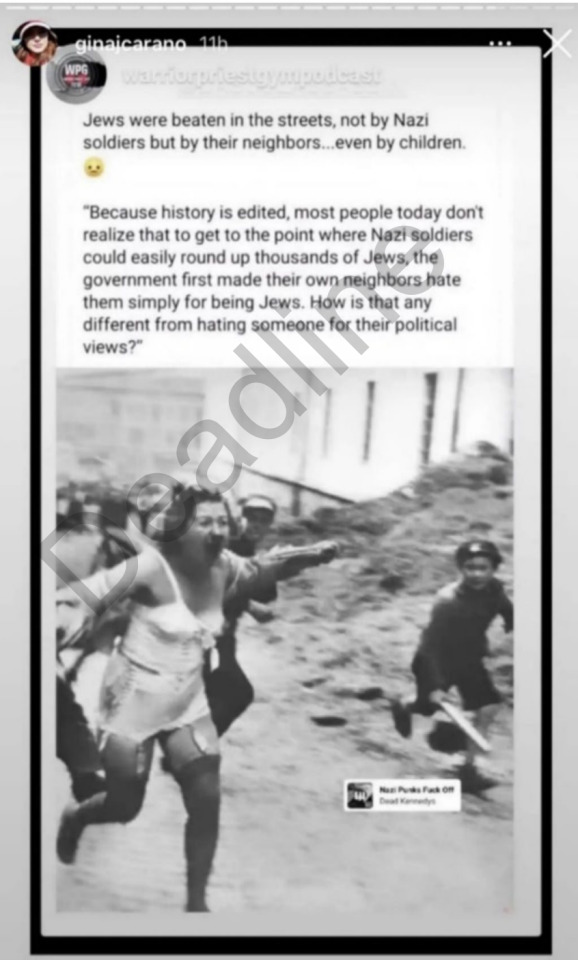
And then Carl posted this in response to conservatives banning books...
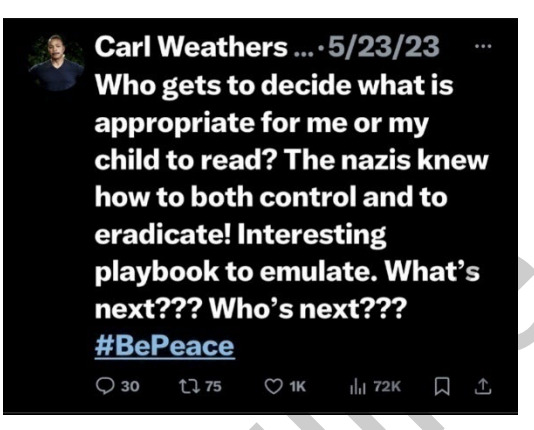
And the document says...
"Even Carano’s male co-star, the late Carl Weathers posted the
exact same message, but no action was taken against him. Nor was
Weathers accused by Defendants of denigrating people based on their cultural and religious identity."
THE EXACT SAME MESSAGE
THE. EXACT. SAME. MESSAGE.
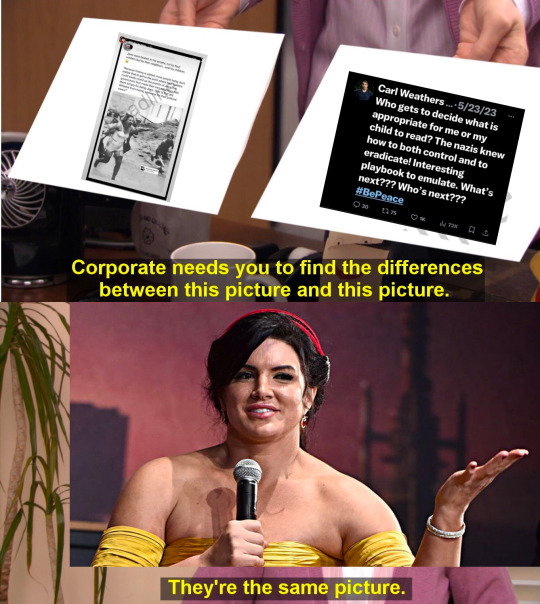
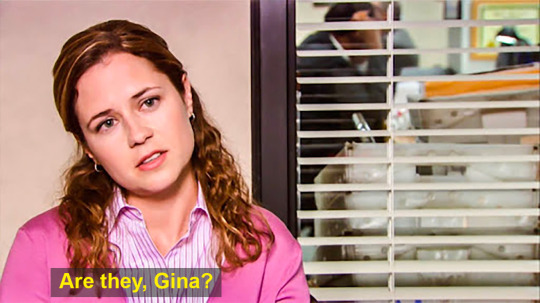
123 notes
·
View notes
Text
Ok, 13 eps in and it’s official - Lost You Forever is this year’s Love Between Fairy and Devil for me, and not just because I am unreasonably obsessed or because I love the design or because it features a protagonist horribly hurt by life and a love interest who gets to them by pure sunshine goodness.
No, it’s because they both are summer dramas that I mocked before they aired and whose cast gave me hives and then I had to eat crow dinner with crow coffee and crow dessert.
I thought the concept of LBFAD (demon king and fairy girl occasionally swap bodies) was risible. I thought anyone who cast Dylan Wang in anything, let alone as a terrifying demon lord, needed to have their head checked. I’ve seen that man in a number of dramas and he can’t act, thought I. Oh, and that trailer was simply awful. This is going to be a great terrible flop and I am gonna enjoy hate watching and mocking it, also thought I. I checked it out solely out of sheer morbid curiosity and I was a gone five minutes in. It ended up my favorite drama of 2022, made it into my top 10 cdramas of all time in fact, and if anyone said Dylan did anything but an amazing job in LBFAD, I’d fight them in the parking lot. Man tore my heart out.
Now comes 2023 and here is another anticipated summer drama, Lost You Forever. If you assume I learned anything from the LBFAD scenario, you would be wrong. (In my defense, in the overwhelming bulk of cases when I hate the concept, trailer and cast, I do not end up adoring the final product.) Nobody could explain the plot to me coherently (not their fault in retrospect, I can’t even explain it myself as it’s more character study than anything.) The concept screams reverse harem, something I am primed to enjoy about as much as I was primed to enjoy LBFAD body swap between female fairy and demon king or perhaps a toothache. The cast - yikes think I. The last Yang Zi drama and performance I enjoyed was the Battle of Changsha. A drama that is a bona fide masterpiece and in which she performed amazingly but was released in 2013, a whole decade ago. Ever since then she’s proceeded to play a range of cheery dimwits who only a mother could love, and only a mother in possession of earplugs and perhaps a gag at that. And to me she started sleepwalking through those roles to boot. Watching her and her dramas became the definition of elevator music. And her leading men here? Ooof! The guy who plays the cousin I’ve never seen in anything. Tan Jianci is good in the right role but I did not think that was going to be a good role and then we get Court Lady Tan Jianci which - shudder. And Deng Wei? Yikes! I’ve seen him in a bunch of dramas and he was the walking incarnation of color beige. And that trailer was a giant huh.
And now here we are. The story is exquisite and I feel so deeply for everyone in it (now, in case of cousin the feeling is the desire to barbecue him but still.) The acting is uniformly good and so is the story. And Yang Zi does not play a cheerful dimwit but a haunted old soul and she does it so well my heart breaks for her and I am so invested in her it becomes ridiculous as I feel her slightest joy or disappointment so intensely. And oh Deng Wei is my other revelation. If someone told me I’d be swooning over a character played by him I would have told them to sleep off all the booze they must have just consumed. But guuh, his 17 just might end up being my favorite male character in 2023 cdramas and I feel for him so deeply and remain amazed how he makes goodness layered and not boring or cloying at all.
That crow feast is sooo delicious!
Am I gonna learn? Hell no! Provided we are not all murdered by a giant asteroid, come back to this space in 2024 to see what other drama that I was prepared to hate I am now obsessing about.
148 notes
·
View notes
Text
Not our typical introductory post but Smoking Angel Isra Hurmanli is not anyone's traditional BHYSW! They all cannot be this gorgeous, seductive, alluring and playful. So hot when she's smoking cigarettes!
ISRA H. FROM TURKEY
TURNS 24 Y.O. IN STYLE!
(DEBUT OF FASHION MODEL)
New to us just in 2024, she is fashion model and beautician Isra Hurmanli from Instanbul, Turkey. She has had a presence on YouTube for close to a year, staring in videos on the "bigo live türkiye" webpage and her own "Misra 1 Isra Hurmanli" page. Wonderful media of her on her Instagram account ([email protected]) with luscious videos and spectacular photographs. Be forewarned, however, if you check out her Social Media, you might be disappointed about the tertiary role cigarettes play, not even second fiddle. But you will most likely end up mesmerized by her beauty if you investigate her SM!
Dual-Media 2-Post, 14-Pack Megapost!
This brief clip was posted on her IG account on June 7, 2023. This is an introductory (debut) post of her, so our purpose is to get you familiar with what she's all about ⏤ how gorgeous she is and how sensationally more sexy she is with cigarettes. To our chagrin, this post is not loaded with super hot cigarette-smoking images. This might be our most smoke-free post within our network. We say that we are 98 percent all-smoking, 2 percent not so much, but we believe our N-S (non-smoking) content is appropriate and fits the context of our narrative and/or the theme of our multi-media presentations (Megapost!). This is what we've intended to do here with Isra Hurmanli. Her YouTube webpage, "Misra 1 Isra Hurmanli" is full of great videos of her ⏤ completely accentuating her remarkable beauty and incredibly sexy dance moves ⏤ but with little smoking and nearly as sparse vaping. Hour-long videos with only a couple of minutes of smoking cobbled within, mostly with her drags offscreen, though we are treated to the exhales on screen. We will download these videos of her from her YouTube page, convert them to QuickTime Player formats and edit them down into clips of her smoking. And compile all of these scenes and snippets into a tumblr-appropriate length video. Will take quite the effort and plenty of time. Also need to point out, she is a Big-Time Party Girl. High percentage of her IG photos with her at restaurants with drinks, multiple drinks, many often in her hand. In much of her "Misra1 Isra Hurmanli" videos, she is drunk. Wasted. Hammered. Barely coherent. Uncoordinated and clumsy. Could be high. Could be on pills. Maybe she is into marijuana in a heavy way. Maybe she's combining these substances. But she's out of it any way that it is going down. Drops her cigarette ⏤ that she had been preparing to smoke for minutes on end ⏤ and has difficulty functioning. Cannot speak to her talking prowess for we do not understand the Turkish language. Our goal is to find appropriate SF content of her and to post that when we can . . . and to create it through editing if we can. So, we do have the project of culling through her vast YT postings to sift through the non-smoking and drunken scenes and to remove them and to find the images of her smoking cigarettes in her glorious manner. When that gets presented within our brand is anyone's guess. We hope you enjoy meeting this Smoking Lovely from Turkey and would look forward to seeing more of her aside from blowing out candles from her 24th Birthday Cake with her exhaled cigarette smoke! This is our most unorthodox debut video. Without question! We firmly believe ⏤ though it might be quite premature to state at this time ⏤ that Isra Hurmanli is a bona fide candidate for 2024 SF Newcomer of The Year! We'll have to see how it all unfolds. Only 344 days left in the year. A potential rival for Newcomer Honors is included at the bottom of this post.
This is Isra's message on her IG homepage, self-description:
Broadcasting & media production company
İSRA Medya Yayıncılık Ve Ticaret Ltd.
Purple Agency
THE MEDIA!
Videos of Isra on YouTube!
From YT's "bigo live türkiye" in 2023 . . .
youtube
From YT's "bigo live türkiye" in 2023 . . .
youtube
Videos of Isra on YouTube (N-S) . . . non-smoking!
From YT's "bigo live türkiye" in 2023 . . .
youtube
From YT's "bigo live türkiye" in 2023 . . .
youtube
Photographs from [email protected]!

From September 16, 2023


From August 12, 2023 (left) and from November 19, 2023 (right)


From November 19, 2023 (left) and from April 23, 2018 (right) smoking as 18 y.o.

From July 1, 2023
Videos from [email protected]!
From April 8, 2023 . . .
instagram
From September 3, 2023 . . .
instagram
Another Candidate for 2024
SF Newcomer of The Year!
Cindi, from Germany, of YouTube "Joe" webpage fame . . .
#SF#Hot women who love smoking cigarettes#Smoking cigarettes#Smoking#Isra Hurmanli of Turkey!#YouTube's “bigo live tütkiye” webpage!#Cindi of Germany and YouTube “Joe” webpage!#YouTube's “Misra 1 Isra Hurmanli” webpage!
61 notes
·
View notes
Text
MotoGP mutterings: life ‘inside the goldfish bowl’
by Mat Oxley, November 2005
It’s not easy being Valentino Rossi. Imagine: you’re trying to get on with your day-to-day job of being the world’s greatest-ever motorcycle racer and you’ve got Ferrari’s F1 bosses all over you like an expensive Italian suit and the Italian media all over you like a bad case of the pox. (And not only that, between races you’ve got to work out how to blow your annual earnings of 15 million quid.)
Rossi’s life has been out of control for years, hounded wherever he goes by a pack of media sharks, but since the Ferrari F1 rumours shifted into top gear, his life in “the goldfish bowl” (as he calls it) has gone from uncomfortable to intolerable. The bike racer who courted fame like no other and whose stardom has eclipsed all others now finds himself embroiled in a guerrilla war with several Italian journalists whom he’s banned from his media conferences for writing stuff he doesn’t like. This is dangerous territory, so is everyone’s favourite bike racer commencing his descent into paranoid megalomania or Jacko-style meltdown?
Rossi has always insisted that he understands the nature of the Faustian pact he’s made with fame and fortune. But if he’s getting upset by what he reads in the papers, he’s obviously forgotten what it means. (And if he thinks he’s got a media witch hunt on his ass he should have a chat with the great Pete Doherty.) To remind him, the Faustian deal for 21st century celebrities goes something like this: you become unimaginably rich from a new kind of global fame which beams you into hundred of millions of homes around the world, day after day, week after week. You are a product with perhaps half a billion customers who all own a little piece of you, whether they’ve bought your T-shirt, drank the beer promoted during a MotoGP ad break or smoked the cigarettes advertised on the side of your motorcycle. It’s not pretty but that’s why you’re so filthy rich. If you don’t like it, there’s a really easy way out of this particular hell hole.
Apparently Rossi fell out with those Italian journalists because they’d written stuff about his private life – revealing details of his night-time shenanigans, questioning his status as a bona fide Italian tax exile, calling his family a bunch of gypsies and so on. Not nice, but that’s the nature of 21st century media, it’s a beast, as another Italian superstar knows all too well: “When a journalist write about the positive, he write five lines,” says opera legend Pavarotti. “When he write about the negative he become a poet.”
If Rossi is to maintain his sanity he’s got to stop reading the papers, whatever they’re saying about him, he’s got to ignore the media bullshit and get on with his life. And if the media give him a hard time for shagging girls, getting drunk or whatever, fuck ‘em. He is a motorcycle racer, after all, and that’s what racers are meant to do – live fast and loose. As someone once said of Rossi’s idol, Hollywood rebel and half-tasty dirt racer Steve McQueen: “Steve loved anything with wheels or tits, probably in that order,”. No reason why Valentino should be any different...
And from now on it seems that either two wheels or four will do for Rossi. Years back he hated F1 because he reckoned it was all about money but more recently he’s been seduced, either by the Ferrari gold or by the challenge of becoming only the second man in history after gentleman John Surtees to win world titles in both bikes and cars. Either way, he’s welcome to it. F1 is a stinking world of repugnant decadence and ostentation, full of money-grabbing, tax-dodging ego-maniacs and obsessive-compulsives with small penises. (I know this for a fact because I used to go out with a girl who once shagged one of F1’s more famous bosses, who failed to impress her despite having popped a Viagra after dinner. Charming, I know, but you get my drift.)
And as for the now relentlessly asked question – will Rossi be able to rule in F1 – two observations: one, who cares, it’s cars not bikes, two, of course he will win. Even former bike racer Damon Hill managed to win the F1 world title, and, hell, I used to beat Daisy (as he was called in the rough, tough club racing paddocks of the early Eighties) when we raced Yamaha LCs around Snetterton. So it really can’t be that hard, can it?
#valentino rossi#motogp#the valentino rossi files: everything i've ever written about vr#by mat oxley#reading
38 notes
·
View notes
Text
The Death in Paradise franchise is coming to Australia with an original, home grown spinoff series, Return to Paradise, coming to ABC in 2024. The series is produced by BBC Studios Productions Australia with Red Planet Pictures for the ABC in association with the BBC, who will screen the series on BBC One and iPlayer in the UK. Return to Paradise combines the DNA of the original global smash hit murder mystery series, with a new, unique Australian take.
Set in the idyllic, beachside hamlet of Dolphin Cove, Return to Paradise is six gripping, twisting and fiendishly clever murder mysteries – all set against the spectacular backdrop of the Australian coastal landscape.
Australian ex-pat Mackenzie Clarke is the seemingly golden girl of the London Metropolitan police force – with an intuitive approach to detective work, she has built a reputation for being able to crack the most impossible of cases. However, she’s suddenly forced to up sticks and move back to her childhood home of Dolphin Cove, a beautiful, coastal paradise... and Mackenzie’s worst nightmare.
Having escaped her hometown at the earliest opportunity six years ago, Mack vowed she'd never come back, leaving a lot of unfinished business and unanswered questions. On her return she’s still no fan of the town, and the people of Dolphin Cove are certainly no fans of hers. In fact everyone would prefer her not to be there, including Mackenzie herself.
But when a murder takes place in Dolphin Cove, Mack can’t help but put her inspired detective brilliance to good use and determines, despite her reservations, that she needs to make the best of it, including tying up the loose ends with the man she left at the altar six years ago.
Created and Executive Produced by Peter Mattessi, James Hall and Robert Thorogood, Return to Paradise features a crack Australian writing team led by Mattessi alongside Elizabeth Coleman, Alexandra Collier and Kodie Bedford.
ABC Head of Screen Rachel Okine says; “We are thrilled to be partnering with BBC Studios Productions Australia and Red Planet Pictures to bring a unique Australian sensibility to this beloved franchise. Return to Paradise promises to be whip smart, intriguing and entertaining - audiences of all ages are invited to play along to figure out whodunit, all while feeling as if they’ve been transported to the perfect summer holiday”.
Kylie Washington, General Manager and Creative Director, BBC Studios Productions Australia says; “Like audiences around the world, Aussies love a good crime series, they’re addictive and bring in audiences week after week. Death in Paradise is a bona fide hit so I’m excited to work with ABC and Red Planet Pictures to expand this world even further. Return to Paradise will introduce audiences to entirely new Australian characters, settings and cases for the team to crack, but with an unsettling amount of murders for a small community guaranteed. This is the second local drama from BBC Studios Productions Australia and is an exciting step as we build our premium scripted business in Australia under Warren Clarke, working with an all Australian creative team.”
Alex Jones, Joint-MD of Red Planet Pictures said: “We are so proud of the global success of both Death in Paradise and Beyond Paradise – each selling to hundreds of territories, watched by millions, and regularly claiming the position of top rated drama in most of them. Return to Paradise is a brilliantly exciting new addition to ‘The Paraverse’ which we are sure audiences will love just as much. It is a completely original drama but takes the essence of what viewers love about Death in Paradise – the fish out of water premise coupled with the most cleverly plotted murder mystery – and gives it a uniquely Aussie flavour. We are also thrilled to already have BBC One and iPlayer in the UK on board as broadcast partners for the show which means that us Brits will be sure to get to meet Mackenzie and the residents of Dolphin Cove in 2024!”
Sue Deeks, Head of BBC Programme Acquisition, says: “Everything we all love about Death in Paradise - the humour, the beautiful scenery, the likeable characters, the ingenious plots - now in a fabulous Australian setting. I cannot wait for BBC viewers to be introduced to Detective Mack and the good (and not so good!) folk of Dolphin Cove. What a treat we have in store!"
Return to Paradise will air on ABC and ABC i-view next year and will be shown on BBC One and BBC iPlayer in the UK. It will be distributed globally by BBC Studios.
Production Credits: BBC Studios Productions Australia, Red Planet Pictures. Produced for the ABC in association with the BBC. Executive Producers for BBC Studios Productions Australia are Kylie Washington and Warren Clarke, for Red Planet Pictures are Belinda Campbell and Tim Key and for ABC are Rachel Okine and Brett Sleigh.
40 notes
·
View notes
Text
Pick Your Poison
Paul/Fem!Reader
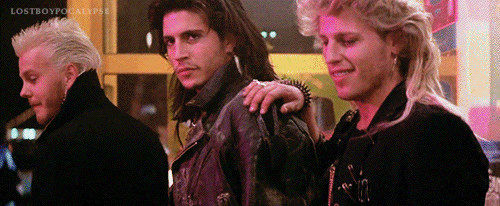
Content: Slow burn, stoner!Paul, he’s the Drugs Guy and I love him, unresolved tension, the Lost Boys are SO toxic
Word Count: 2.9k

The neon sign in Saigon Soul’s window hummed, luminous and red, casting vermillion’s feather-soft hue across the rapidly cooling colors of the night. The last rays of the sun had faded less than an hour ago: but as soon as they did, like clockwork, your new favorite entertainment emerged. Just like he did every night. A reverse Cinderella.
Red looked good on Paul. It haloed his product-stiff blonde mane in a ruby glow and glittered like pomegranate seeds in a marching line down his gilded row of medallions. Turned his off-white eyes and teeth pink, too. He huffed, smacking his lips obnoxiously in an effort to puff away the heat of his extra-spicy beef noodle pho, flapping his hands about. The piles of bracelets on his wrists jangled.
“Fuck me, man. That’s good.” He said in his usual laid-back, loose tone after a gulp of iced tea from his flimsy paper cup.
“Mmm.” You hummed and picked up a heavy shrimp spring roll with your chopsticks. Maybe it was the thick seaside summer air, or the heavenly deep-fried smells that wafted your way every time the narrow restaurant door opened, but the damn things smelled amazing. “Told ya. This place is a total hole in the wall but their food’s primo.”
“Uh-huh.” He sucked pepper oil off the pad of his thumb and scratched his stubbly cheek contemplatively. Even like this, reeking of sweat and looking like a cat got lost in his hair somewhere, he was so beautiful it was almost ridiculous. Damn those baby blues. “My man Dwayne’s gonna dig on this stuff. He’s one bona fide heat fiend. Eats the fuckin, the… the uh…” He snapped his fingers a few times, brows furrowed in utmost stupefied contemplation. “The little spoons, with the red powder on top, you know—”
“Tamarind candy?”
His face lit up like the sun. Jesus Christ. That smile was a flashbang, a dynamite stick, a stun baton. Made you go all stupid. “Yeah! Yeah, man, the tamarind candy! Gotta get him some of that stuff.”
You looked down at your paper plate of food and worried at the inside of your lip with your teeth. Somewhere down the street dance music was playing. Car lights ghosted over your and your dinnermate, lighting up the strangers that walked by on the sidewalk next to you. It was by all means a perfect night: balmy wind and the distant sound of the boardwalk rides on the air. But Paul bringing up his brother… it sent an uneasy sensation down your spine and you couldn’t quite pin down why.
Paul had stumbled into your life three weeks ago, completely drunk on the beach. You’d been a good samaritan: held his hair back while he puked, tossed him a bottle of water while he reeled and slurred out that his brothers had dumped his ass for being too intoxicated. But the whole while, he grinned. Like he could enjoy anything. Like no matter what situation life put him in, he’d find some way to have fun.
He sat by your little bonfire in the grassy dunes and you chatted. You showed him some of your stick-n-poke tats and he’d insisted on getting one himself. And (in a decidedly less good samaritan way) you’d given him one, india ink blackening your fingers and his inner arm skin cold under your fingers. And that’s how you’d gotten to know him, how you’d continued to know him over the last collection of days. Alone, just him. His weird, easily-distractible, impulsive, entertaining self. He mentioned he had three brothers, once or twice, and you took it in stride.
Then you’d seen him with them.
He was like an entirely different person.
Across the sea of beach boardwalk heads you’d spotted him. But it didn’t feel like him. He sat lazily up on a railing surrounded by equally eccentric young men, and they watched the crowd like tigers. Like mad kings looking down on their kingdom. A beautiful young woman passed and they all jeered, whooping and whistling and clapping: even Paul. With an aggression and odd hunger in his eyes you’d never seen before. They all moved in tandem, like wolves, wordlessly communicating in a way that made your skin crawl.
You left.
Now he was Paul again tonight: just Paul, the Paul you knew and hoped to god was the real version. The guy who couldn’t talk and chew gum to save his life. The guy who declared a thumb war with you and proceeded to lose six times in a row. The guy who delighted in rocking the sky-glider that slowly trundled over the pier until you were shrieking and clinging to his coat.
Either way, real Paul or not, you were glad you’d yet to meet his family.
The blonde stretched, yawned, and hopped out of his seat, digging a hand into his dingy riding pants pocket. When you moved to counter, pulling your wallet out of your bag, he uh-uhed you and flapped his own leather-bound one in your face. “Not a chance, girl. Paulie’s good for it.”
You raised your brows. As far as you knew, he was a surf bum with a penchant for partying. No way was he holding down a nine to five to pay for dinner.
Paul scoffed at your look. “I got a freebie from a real charitable dude.” He flashed the corner of a hundred at you and stuck out his tongue with a smile before wrestling two fives out of his cash-thick wallet.
“Uh-huh. Someone just… handed you what, looks like… six hundred bucks?”
“He didn’t need ‘em anymore.” Paul didn’t even watch his wallet fall, he just dropped it to the table, flattening the bills to presentability with his fingers. “Try not to miss me, ‘kay?” In a whirl of pungent sea salt and old-timey coattails he was inside the little eatery, the bell on the poster-covered door jingling.
You idly scratched at the hem of his leather wallet with your thumb nail while you waited. Real charitable dude, huh? You weren’t stupid. Paul was a street fiend. Ran trades and exchanges from the pockets sewn inside his coat with practiced ease, like he was born to sell ditchweed and glass-cut coke to summer-break college students. No doubt that’s where the money came from. Hell, the way he was standing around with his brothers… you wouldn’t be surprised if they were his suppliers.
Something crunched under the edge of your nail. You brought your thumb to your face. There was a line of red, deep and nearby brown, trapped between the keratin and your skin. Dirt, obviously.
It was dirt.
Had to be dirt.
Like a category three hurricane, Paul was back, and before you knew it you were on your feet and moseying down the bustling town avenue. One of his long, lithe arms was draped almost crushingly over your shoulder, holding you to his side. He jingled with every footfall. Golden strands of hair blustered in the corner of your vision and you felt his ribs, pressed against your side, swell and contract with a contented sigh.
Two could play at that overconfident, wild-child game. With a little effort you extracted a pinned arm and shoved it under his coat, grabbing his waist over his mesh top and holding him much in the same way he held you as you jaunted down the avenue. He threw his head back and laughed, his stride never wavering.
“You kinda got guts, girl.” He cackled into the coastal breeze.
“So, Paulie.” You ignored his needling, crossing the crosswalk and ambling past seemingly endless pizzerias and cinemas and smoke shops. “Level with your good, kind, very honest and transparent friend. How many acid tabs did you sling to get that sorta funding?”
Paule shook your shoulder with a strong hand. “Wasn’t lyin’ to you, c’mon. I really did get that green for free.” The walk sign nearby turned from stop to go and you crossed another street. “Me and my brothers, we got ways, y’know? Not gonna be strapped for cash any time soon.”
Sometimes, when Paul looked at you just right, you thought your damn heart was gonna beat out of your chest. Like he saw right through the bullshit into your soul. But other times, times like now, you realized just how little you actually knew the guy.
“I got ‘bout an hour before I gotta jet, girl.” Paul started talking again and you blinked: you’d arrived in front of the bulb-studded Casino Arcade arched entrance at the boardwalk without even noticing it. When you looked up at him, he was already looking down at you, eyes crinkled in kiddish mischief. “You down for a puff ‘n play?”
“Just an hour?” You mockingly pouted, extracting yourself from him and crossing your arms broodingly in the small ever-flowing crowd of young adults going in and out of the noisy arcade. “Geez, Paul. What am I, a time-killer till you can go have real fun?”
He laughed and there was a bark to it. “If you could handle real fun I’d take you with me.” A little of his usual spaced-out bliss receded. “But I, uh. Don’t really think the guys would appreciate a plus one at our… parties.”
“Wow.” You deadpanned. “Not vague and condescending at all.” With a conceding huff you punched his shoulder playfully, making his body rock like an inflatable car-sale mascot. “Fine, blondie. I’m game.” Paul was grinning from ear to ear and dragged you by the sleeve off to the underside of the pier, fishing around in his inside pockets. “But none of that skunkweed, you hear me? And if I kick your butt at Speedway again you gotta gimme your ring like you promised last time!”
He stopped short so quickly you nearly collided with his tall, narrow back. Paul whirled around. “Yeah? What do I get if I win?”
You were very acutely aware of how close he was standing, nearly chest-to-chest, and how the shadow-painted back side of the arcade by the barnacle-stippled pier was much less crowded than the arcade. You swallowed and his sharp, playful gaze tracked the motion of your throat reflexively. “It’s— augh, um— mystery prize. Can’t tell you what it is till you win. Which you won’t.”
He was silent for a few seconds, sucking on the inside of his cheek. Thinking. Then he grinned. “Alright.” He flicked a lighter across his knuckles and pressed the button down. The little firelight flickered wildly in the turbulent air. “Let’s get toasted.”
Sitting down in the shadow-dark sand between the pier legs, watching him roll a joint right then and there on his narrow knee, you reeled. Sometimes you really couldn’t tell what his deal was. Were you a time-killer? A listening ear? A friend? The way he looked at you, sometimes— it didn’t feel friendly.
If it was good or bad, though… the jury was still out on that one.
So. It wasn’t skunkweed.
It was nice and palatable and bright. Absolutely top-shelf stuff he was handing out to you pro-bono. The world was a delicious blur: arcade lights were multihued and the speaker music was pop-y and completely grooveable. Your skin prickled in the hot interior air: fabric just felt better after a few puffs. And god, Paul was the funniest, weirdest, most oddly endearing beanstalk of a man when he was on the stuff.
He had his forehead pressed so hard to the claw machine it was going to leave a red halo: he beat the side with his fist and howled in breathy, entertained frustration when the wimpy claw let the neon green monkey plush slip from its grasp under your careful joystick management. “Ahh, you dropped it again! Unbelievable!”
“It’s not exactly made to be easy, doofus! I’d like to see you try.” You half-chuckled, half-grumbled, feeding the hungry quarter slot more change. You missed the slot a few times before you succeeded.
Paul reeled back and rounded the machine like a big cat, waving jingly arms. “You’re an amateur, girl. Let a pro show ya how it’s done.”
You assumed he’d push you out of the way: god knows he'd done it before. But no, of course now he decided to act exactly like the Paul you’d come to know. He pressed up behind you, chin tickling the crown of your head, and put a hand over yours on the joystick when the machine popped back to life, revitalized by the loose change. It chirped out a happy eight-bit tune and Paul hummed along to it, guiding the claw around and back. His fingers were cool over yours. You could feel his belt buckle biting into your back over your shirt.
You held very, very still, mouth pressed into a thin line. He jammed the drop button. The claw lowered, clamped over the green monkey, and hauled it over to the prize chute. It dropped it without a hitch: the plush clunked into the deposit receptacle.
Paul’s mouth was behind your ear, cold breath on the shell of it. “See? Pro.”
Then he was gone, crouching like an animal by the chute and wrestling the monkey free, and god you were reeling again: collecting your very high nerves with hands still clutching the sweating joystick plastic.
“What’s my prize?”
“...Huh?”
Paul doubled down, resting his weight against the Blasteroids arcade machine and wiggling the monkey at you. “I won. What’s my mystery prize, hmm?”
You collected yourself enough, finally. At least enough to scoff dismissively. “Please, I basically wiped the floor with you in Speedway and Super Mario—”
“You can’t argue with evidence, girl.” When you lunged to snatch the green ‘evidence’ out of his grip he reached upwards with it, holding it over your head mockingly, a cheshire smile on his face. “Cough it up. I want my prize.”
You jumped for the monkey and it went even higher. Grumbling and hopping and face starting to grow very flushed with an ‘I don’t have a fucking mystery prize’ panic, you rambled and cajoled at him, flipping between wheedling and threatening. It took you about fifteen seconds to realize he was no longer staring down at you, but rather over your head.
“Paul.” A laid-back, low male voice said evenly from behind you.
An icy knot formed in your stomach. You turned, slow as a glacier, and yep, it was exactly what you thought it was. Two of the brothers you’d spied the blonde hanging out with before. The tall, dark, and brooding one, and the peroxide-spiked trench coat model.
The latter lifted his eyebrows at you when he caught you staring. A tight, cold smile graced his lips for a moment before he turned his cutting gaze back to his brother. “Thought we all agreed to be at the statue by ten. We missed you.” His eyes slide back to you. “Who’s your friend?”
You stood as tall as you could in the given circumstances, feeling rather like a park ranger making himself as big as possible to frighten off a bear. An introduction was on the tip of your tongue. It got knocked off of it when Paul abruptly elbowed past you, shoulder-checking you hard enough to offset your balance. When he stood by his brothers, he looked exactly in place. Like he was meant to be there.
He glanced down his nose at you. There was a different sort of smile on his face. An insider smile. One you didn’t feel like was for you. “Just some chick, David. Y’know how it is. Where’s Marko?”
“Scoping out dinner. Probably waiting on us, now.”
“Shit man, then let’s go!” Paul crowed, snapping his fingers and grinning, tongue trapped between his teeth. “I’m starvin’.”
The whole while they talked, the tall, dark-haired one watched you with crossed arms. Taking in the way your face shifted, the confused, hurt pinch in your brow. The pac-man machine illuminated half his face, like a skull of amber-yellow. You caught his eye. The intensity of his gaze forced yours down to the multicolored carpet.
“After you.” David gestured broadly with a gloved hand towards the arcade entrance, and Paul flounced towards it without so much as a goodbye or a sparing glance in your direction, even after an entire evening together. David looked at the dark-haired one. “Dwayne. Time to roll.”
A long-drawn out pause. You refused to look up.
“...Comin’.” Dwayne eventually said. The trio disappeared between arcade machines, tops of their heads barely visible, then vanished into the crowded Santa Carla night.
The green monkey was abandoned on the floor, limbs splayed. You picked it up, its glassy plastic eyes blankly reflecting the arcade lights. Like it was mocking you for being there, alone, after that.
“Fucking asshole.” You breathed in disbelief to yourself. Far more hurt than you thought you’d be. You’d hung out with him for what, six days, tops? Were you even friends? Was he not just some nighttime stranger, a weirdo who emerged from the woodwork to show you a good time once in a while? Paul was good. Paul was fun. He was a fat blunt and a shot of tequila and a roller-coaster ride all wrapped up into one person.
You’d picked him as your poison of preference. It was a good poison. Now you were starting to wonder if you’d picked wrong.

#the lost boys#tlb paul#The Lost Boys 1987#tlb fanfic#my writing#does this fic go anywhere? no. but i simply wanted to write it#having lots of Paul Thoughts today so
135 notes
·
View notes
Photo







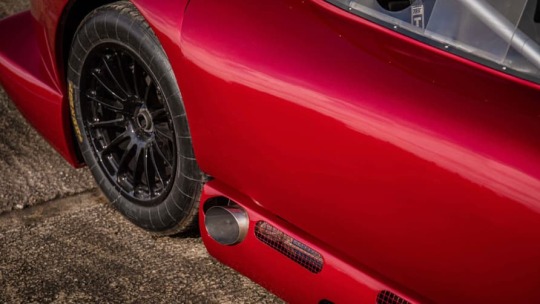
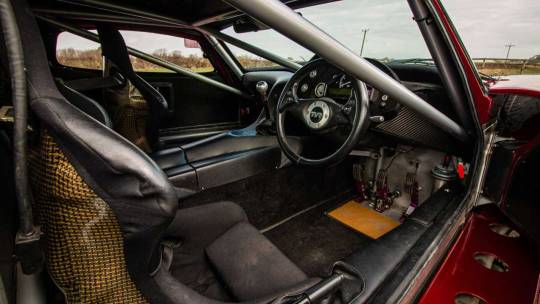

TVR Cerbera Speed 12
This is a terrifying machine. And it’s a car so terrifying that, after a test drive of one of the prototypes, the boss of TVR decided against putting it into production.
And when that boss was Peter Wheeler, who thought airbags were more trouble than they were worth and that ABS was just a crutch for poorly set up cars, you likely have some idea of what it takes to terrify him.
In fact, we’d argue that Wheeler’s the man who made TVR a byword for terrifying. After he took the reins of TVR, he ditched the Cologne V6s in favour of Rover V8s. Which he then pushed out, bored out and maxed out. But after nearly tripling the Rover V8’s power, Wheeler ditched it entirely in favour of a V8 and straight-six of TVR’s own design.
TVR’s tilt at top-tier racing, however, would require even more madness.
But then it would, considering it was shaping up to be Blackpool’s merchants of oversteer up against the industrial might of Mercedes, the racing pedigree of Porsche and the bona fide genius of Gordon Murray. Yep, TVR’s planned racer would be up against the Mercedes CLK GTR, Porsche GT1 and McLaren F1 Longtail.
Surmounting such a daunting challenge was approached in... let’s say typical TVR fashion. The 7.7-litre V12 (which was, at its most basic, two of TVR’s AJP-6 straight sixes combined) apparently snapped the input shaft of TVR’s 1,000bhp-rated dyno. A top speed in excess of the McLaren F1 was mooted. And, yes, Peter Wheeler, who raced 500bhp-per-tonne TVRs in the one-make Tuscan Challenge, was so spooked by the end result that he deemed the road-going Speed 12 entirely too bonkers and pulled the pin on the road-going car. Yes, too bonkers for TVR. Imagine how mad.
See, TVR did end up building just one Speed 12 road car – an amalgam of road car, prototype chassis, and racing parts – and sold it to a buyer personally vetted by Wheeler himself. And it was every bit the madman that everyone expected it to be. The sheer weight of what was onboard the Speed 12– namely, that 7.7-litre V12, with around 850bhp and 900lb ft – was belied only by the eventual kerb weight: around 1,000kg.
62 notes
·
View notes
Text
It was a last-minute impulse purchase. Two hours before showtime, I watched resale prices finally begin to fall for the extremely sold-out opening night of Taylor Swift's six-night "residency" at Los Angeles' SoFi stadium. Even as a non-Swiftie, it has been impossible not to follow the feverish local coverage of international pilgrimages, friendship bracelet-making, and traffic warnings. But that split-second pop culture purchase was, for me, pure irrationalism.
With no fringe or Eras-themed ensembles in my closet, I rushed to my single seat through a sea of sequined, screaming squads with trepidation and a dull white button-down. Would I, a fortysomething South Asian man with passing knowledge of Swfitism be identified as an unwelcome interloper? Instead, my very gracious neighbor schooled me on how to wear my allotted LED bracelet, and soon I was alight in the same neon pink as the sea of humanity around us, Swift finally emerging out of parallel technicolor hues. The big tent revival swept away any fears, differences, doubts.
For three and a half hours, I too was part of the zeitgeist – a final chapter in a summer of spectacular pop culture revival led by three women at the peak of their powers.
Greta Gerwig, Beyoncé Knowles-Carter, and Taylor Swift have been the bona fide superstars of this American summer, transcending their own previous triumphs to reach unprecedented new heights.
#HotGirlSummer is now more specifically #BillionGirlSummer, with Barbie already the first woman-directed film to gross more than a billion dollars and Beyoncé and Swift's dual stadium tours estimated to gross similarly dizzying amounts, each pumping even more into fledgling local economies around the country.
In a city without a center and isolating car culture, for one week Taylor Swift transformed LA's stadium into a cathedral – an in-person congregation for hundreds of thousands. Soon Beyoncé will bring her roving "Renaissance" to the same stadium for three nights. Across Los Angeles, cinemas are still packed with squads of women and let's not deny it, many men – dressed in 50 shades of pink laughing and crying alongside Barbie's quest to become whole again.
[...]
It's been impossible to avoid the incessant social media coverage of this trinity of pink extravaganzas. Even my Pakistani immigrant father is texting me about how to join the Verified fans waitlist for Taylor's next dates. Despite the exorbitant prices for concert tickets, travel and even local movie theater outings – not to mention endless product tie-ins for all manner of merchandise — is this feverish demand simply consumer madness? Is it the cumulative decline of seriousness and taste that pretentious critics lament?
The answer is a resounding no. The hype surrounding Barbie, Beyoncé's Renaissance, and Taylor's Eras tour is commensurate with the sheer amount of resources, time and attention so many Americans of all races, genders and ages are devoting to being part of this moment. Critical acclaim has followed each of these works, layers of meaning are being made. They are an undeniable triumph of women's creativity and ownership. Nobody I know of is asking for refunds.
At a deeper level, the roaring return of big tent monoculture follows the ennui of lockdowns. It is pop at its collective and connective best – the very opposite of the culture that has defined the recent past – a splintered, atomized state of streaming individualism that seemed to be a permanent new state of affairs. The promise of streaming allowed for a kind of hyper-specificity that ensured incessant algorithm based devotion to the platform of delivery. Insularity, it turns out, has its limits. With at-home viewing no longer the only medium for entertainment, I'm certainly not alone in craving the very opposite.
[...] In the communal ecstasy of sold-out Barbie screenings and stadium séance of Beyhives and Swifties – the mood is strategic and intentional inclusion.
What Gerwig, Swift and Carter-Knowles have created in each of their new masterworks are gated dreamworlds. Swift in her moss-covered cottage of Americana folklore turns stadiums into fireside chats for any romantic, Beyoncé's House of Chrome is a black queer club as a spaceship of alien superstars soaring above the fray – and Barbieland is a pastry inversion of the real-world's patriarchy.
There are serious political undercurrents to all this, but the mood at the experiential level is buoyant, escapist and even comedic. Hovering on the distant horizon are Presidential elections and reminders of climate catastrophe but here is a ticketed invitation to get dressed, join the festivities and for the duration, release the wiggle, to quote the "Renaissance."
The closing note of each of these spectacles is a kind of transfer of energy, exuberance and American optimism that has been absent from public and cultural life for years.
Winter is of course coming. But in the interim, there has been a remarkable sense of sunshine this summer. Even those not in attendance have felt the afterglow of the women at its center. Not a cruel, but a communal, collective, and yes, glorious summer.
#the thing is#WOMEN.#we love to see it#taylor swift#beyonce#eras tour#renaissance tour#barbie#barbie (2023)#greta gerwig#npr
27 notes
·
View notes
Photo

On June 3, 1969, the final episode of Star Trek aired. Created by Gene Roddenberry it follows the adventures of the starship USS Enterprise (NCC-1701) and its crew. It later acquired the retronym of Star Trek: The Original Series (Star Trek: TOS or simply TOS) to distinguish the show within the media franchise that it began.The show is set in the Milky Way galaxy, roughly during the 2260s. The ship and crew are led by Captain James T. Kirk (William Shatner), first officer and science officer Spock (Leonard Nimoy), and chief medical officer Leonard McCoy (DeForest Kelley). Shatner's voice-over introduction during each episode's opening credits stated the starship's purpose:Space: the final frontier. These are the voyages of the starship Enterprise. Its five-year mission: to explore strange new worlds, to seek out new life and new civilizations, to boldly go where no man has gone before.The series was produced 1966–67 by Desilu Productions, and by Paramount Television 1968–69. Star Trek aired on NBC from September 8, 1966 to June 3, 1969. Star Trek 's Nielsen ratings while on NBC were low, and the network canceled it after three seasons and 79 episodes. Several years later, the series became a bona fide hit in broadcast syndication, remaining so throughout the 1970s, achieving cult classic status and a developing influence on popular culture. Star Trek eventually spawned a franchise, consisting of five additional television series, twelve feature films, numerous books, games, toys, and is now widely considered one of the most popular and influential television series of all time.
22 notes
·
View notes
Text
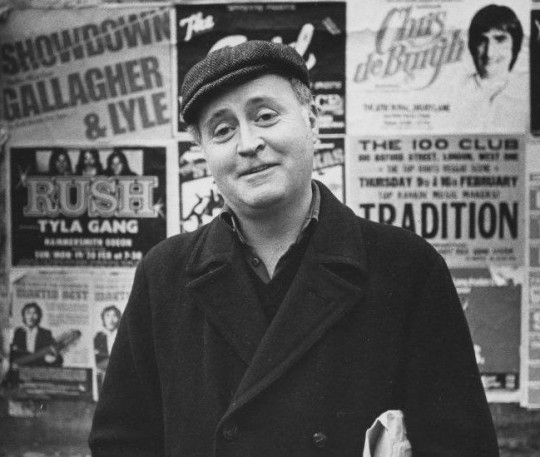
The battle to remove censorship from the British stage was fought primarily at the Royal Court theatre in London during the mid-1960s. The plays of Edward Bond, one of the most important British dramatists of the 20th century, who has died aged 89, were an essential part of that story and that struggle.
Bond had submitted plays to George Devine’s recently established English Stage Company at the Royal Court in 1958 and, as a result, was invited to join the theatre’s Writers’ Group. His first performed play, The Pope’s Wedding, was given in a production without decor on 9 December 1962, and Devine then commissioned a new play, which Bond submitted in September 1964.
That play, Saved, was presented privately for members of the English Stage Society in November 1965 after the lord chamberlain – the official censor to whose offices all new theatre plays had to be submitted – demanded cuts in the text. The play was the most controversial of its day, not just because of the explicitness of the sexual swaggering and dialogue, but because of a scene in which a baby is stoned to death in its pram.
The stays of middle-class propriety in the contemporary theatre had already been given a good vicious tug in the work of David Rudkin and Joe Orton, but this was something else. There was uproar in the theatre, and in the reviews, and a visit by the police. The theatre was hauled into court after an alleged minor breach of the club licensing laws, and many notable witnesses, including Laurence Olivier, spoke in the play’s favour. Penelope Gilliatt wrote in the Observer that the play was about brutishness, not brutish in itself: “The thing that makes Saved most painful to watch is the fact that the characters who won’t listen to other people’s desperate voices are in despair for lack of a listener themselves.”
Bond’s next play, Early Morning, was banned outright. It was a surreal fantasy, featuring Queen Victoria and Florence Nightingale as lesbian lovers, two conjoined twin princes, and cannibalism in heaven. Again, the vice squad paid a call, performances were cancelled and a private dress rehearsal arranged for the critics in April 1968.
By now the theatres bill was on its way in the House of Commons, becoming law in September. Plays were finally removed from the control of the lord chamberlain, who had held censorious sway over the nation’s entertainment since 1737. Violence, sex, political satire and nudity were bona fide subjects at last for the modern theatre.
William Gaskill, the artistic director of the Court in succession to Devine, mounted a Bond season in 1969 that established his reputation both in Britain and abroad, during a tour to Belgrade and eastern Europe. Saved was given 14 productions in West Germany and opened to acclaim in the Netherlands, Denmark, Japan, Czechoslovakia and the US.
This period was one of defiance at the Royal Court, and the experience marked everyone who worked there for life, none more so than Bond and Gaskill. Bond was acknowledged as the inheritor of Brecht’s legacy in the flintiness of his writing and the uncompromising artistic vision of his scenes and stage pictures.
He wrote many fine plays in the subsequent decade: his Lear (1971) was a majestic, pitiless rewriting of Shakespeare, with Harry Andrews unforgettably scaling a huge, stage-filling wall at the end; Bingo (1973) and The Fool (1975) drew chilling portraits of English writers – Shakespeare (played by John Gielgud at the Court – and by Patrick Stewart in a 2010 revival at Chichester) and the rural poet John Clare (Tom Courtenay) – at odds with their societies, driven respectively to suicide and madness; and The Woman (1978), the first new play to be produced on the National’s new Olivier stage, was an astounding, panoramic survey of Greek myths and misogyny.
Bond was born in Holloway, north London, one of four children. His parents were farm labourers in East Anglia and had come to London looking for work. Bond was evacuated during the second world war, first to Cornwall and later to live with his grandparents near Ely, Cambridgeshire. He attended Crouch End secondary modern school in London in 1946 and left when he was 15. “That was the making of me, of course,” he said, “you see, after that nobody takes you seriously. The conditioning process stops. Once you let them send you to grammar school and university, you’re ruined.”
He enjoyed the music hall and was impressed by Donald Wolfit as Macbeth at the Bedford theatre in Camden Town in 1948: “I knew all these people, they were there in the newspapers – this was my world.”
After school he worked as a paint-mixer, insurance clerk and checker in an aircraft factory before beginning his national service in 1953. He was stationed in Vienna and started to write short stories.
Once Saved had been performed and he knew he would always work in the theatre, he bought a house on the edge of a small village, Wilbraham, near Cambridge, and lived there contentedly with his wife, the German-speaking Elisabeth Pablé, a writer, whom he married in 1971 and with whom he collaborated on a new version of Wedekind’s Lulu based on some newly discovered jottings and manuscripts in the early 90s.
His early plays were often based in situations and societies he was familiar with, whatever their period setting, but Bond’s later work took on a more resonant, prophetic, some felt pompous, tone. Put simply, according to Richard Eyre and Nicholas Wright in Changing Stages, their 2000 account of the British theatre, Bond used to ask questions; now he gave answers.
He acquired a reputation as a rather remote guru, and his later, proscriptive epics about the failure of capitalism and the violence of the state were more often performed by amateurs than by the leading companies in Britain.
The Worlds (1979), for instance, was first given by amateurs in Newcastle, but its scope was immense, charting the collapse of a successful business operation riddled with strike action, terrorism, kidnappings and long speeches. In one of these, a terrorist defines the two worlds as one of appearance and one of reality. In the first, she says, there is right and wrong, the law and good manners. In the second, which controls the first, machines and power.
Before going into what he called voluntary exile from the British theatre establishment, Bond wrote the “pastoral” Restoration (1981) for the Court, an often witty inversion of a Restoration comedy, with Simon Callow in full flow as Lord Are, and Summer (1982) for the National, a comic, modern rendering of The Tempest set in the sunny Mediterranean.
Bond was a dapper, withdrawn man who could be intimidating, but disarmingly gnomic and self-deprecating when he was in the mood. Sympathetic interviewers could be treated to bilious attacks on directors such as Sam Mendes – whose 1991 revival of his 1973 comedy The Sea, a beautiful play of madness and dehumanisation in an Edwardian seaside town, he loathed – and Trevor Nunn (who, he said, turned the National Theatre into “a technicolour sewer”), though he never raised his voice and often dissolved into mischievous chuckling.
Even the collapse of eastern European socialism could not stem the flow of Bond’s writing. “Before, as a socialist writer,” he once told me, “you knew there was a framework, a system to which the play might eventually refer. But now, the problem of the last act has returned! And I was always a critic of the system to start with. That’s why I wrote my version of King Lear.”
More recently, you had to hunt pretty hard to find his new work. There was an intriguing season of six plays at the Cock Tavern in the Kilburn High Road, north London, in 2008, and several more performed by Big Brum, a theatre-in-education company in the Midlands, between 2012 and 2014.
Jonathan Kent directed a revival of The Sea at the Haymarket, starring David Haig and Eileen Atkins in 2008, while Sean Holmes provided the first London production of Saved in 27 years – still harrowing, more pertinent than ever – at the Lyric, Hammersmith, in 2011.
Following the example of Brecht, Bond was prolific in supplying his work with the extra apparatus of poems, prefaces and notebooks, though, unlike Brecht, a giant of an intellectual all-rounder in comparison, and a far superior poet, he was always better when restricting himself to stage dialogue.
He also wrote for films, including the screenplay for Nicholas Roeg’s Walkabout (1971), set in the Australian outback and starring Jenny Agutter and David Gulpilil, and the Nabokov adaptation Laughter in the Dark (1969), as well as contributing dialogue for Michelangelo Antonioni’s Blow-Up (1966) and Nicholas and Alexandra (1971).
At his best, he was a genuine poet of the stage, and exerted an enormous influence on at least two generations of theatre workers after him. It is possible that some of the unknown plays of his later, post-nuclear apocalyptic period will be ripe for assessment. The place of at least 10 of his earlier plays is secure in the national literature and they are certain to be revived. He remains much admired and often performed in France and Germany.
Elisabeth died in 2017.
🔔 Thomas Edward Bond, playwright and director, born 18 July 1934; died 3 March 2024
Daily inspiration. Discover more photos at Just for Books…?
4 notes
·
View notes